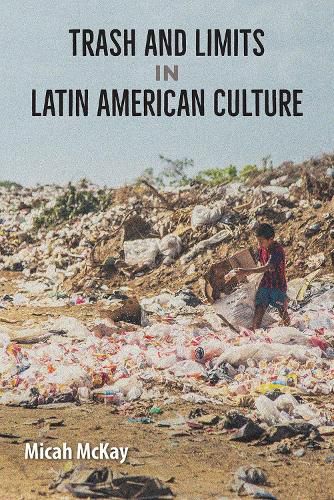Readings Newsletter
Become a Readings Member to make your shopping experience even easier.
Sign in or sign up for free!
You’re not far away from qualifying for FREE standard shipping within Australia
You’ve qualified for FREE standard shipping within Australia
The cart is loading…






This title is printed to order. This book may have been self-published. If so, we cannot guarantee the quality of the content. In the main most books will have gone through the editing process however some may not. We therefore suggest that you be aware of this before ordering this book. If in doubt check either the author or publisher’s details as we are unable to accept any returns unless they are faulty. Please contact us if you have any questions.
The ecological, social, and aesthetic functions of garbage in literature and film from Argentina to Mexico
This book looks at the role of waste in Latin American cultural texts from the twentieth and twenty-first centuries and makes the case for foregrounding trash as an object of analysis in literary and cultural studies in Spanish America and Brazil. By considering how writers and filmmakers engage with the theme, Micah McKay argues that garbage illuminates key limits related to the region's experience with contemporary capitalism.
Recognizing trash as an important social reality, McKay traces its appearance in a diverse range of products: novels and documentary films with dumps as settings, short stories whose main characters are garbage pickers, and works that portray writing as a process of piecing together found materials. McKay argues that waste and the problems it poses are key to understanding marginalization, political struggle, and the production of aesthetic value.
Drawing on insights from material ecocriticism, discard studies, and biopolitics, McKay theorizes that trash opens a space of reflection on what it means to be human, the possibilities for building community amid catastrophe, gendered notions of labor and care, and the pitfalls of neoliberal environmentalism.
McKay shows how trash in literature and film helps readers and viewers contemplate the limits of how we inhabit the planet.
Publication of this work made possible by a Sustaining the Humanities through the American Rescue Plan grant from the National Endowment for the Humanities.
$9.00 standard shipping within Australia
FREE standard shipping within Australia for orders over $100.00
Express & International shipping calculated at checkout
This title is printed to order. This book may have been self-published. If so, we cannot guarantee the quality of the content. In the main most books will have gone through the editing process however some may not. We therefore suggest that you be aware of this before ordering this book. If in doubt check either the author or publisher’s details as we are unable to accept any returns unless they are faulty. Please contact us if you have any questions.
The ecological, social, and aesthetic functions of garbage in literature and film from Argentina to Mexico
This book looks at the role of waste in Latin American cultural texts from the twentieth and twenty-first centuries and makes the case for foregrounding trash as an object of analysis in literary and cultural studies in Spanish America and Brazil. By considering how writers and filmmakers engage with the theme, Micah McKay argues that garbage illuminates key limits related to the region's experience with contemporary capitalism.
Recognizing trash as an important social reality, McKay traces its appearance in a diverse range of products: novels and documentary films with dumps as settings, short stories whose main characters are garbage pickers, and works that portray writing as a process of piecing together found materials. McKay argues that waste and the problems it poses are key to understanding marginalization, political struggle, and the production of aesthetic value.
Drawing on insights from material ecocriticism, discard studies, and biopolitics, McKay theorizes that trash opens a space of reflection on what it means to be human, the possibilities for building community amid catastrophe, gendered notions of labor and care, and the pitfalls of neoliberal environmentalism.
McKay shows how trash in literature and film helps readers and viewers contemplate the limits of how we inhabit the planet.
Publication of this work made possible by a Sustaining the Humanities through the American Rescue Plan grant from the National Endowment for the Humanities.